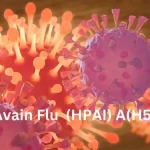New Covid Variant: CDC Reports Surge of Highly Contagious HV.1 Omicron Subvariant Across US
A new COVID variant, HV.1, identified as a highly contagious omicron subvariant, has been rapidly spreading across US states since its initial report in late summer. According to the US Centers for Disease Control and Prevention (CDC), HV.1 surpassed other COVID variants, including EG.5, by October, constituting 30% of new infections among US citizens in December. This sublineage of omicron XBB.1.9.2 and a direct descendant of EG.5 is outlined in the CDC’s SARS-CoV-2 lineage tree.
Symptoms of new COVID variant HV.1 align with those of other COVID variants and include fever, cough, shortness of breath, fatigue, muscle or body aches, headache, loss of taste or smell, sore throat, congestion or runny nose, nausea, and diarrhea. The CDC emphasizes the virus’s high transmissibility, attributing it to mutations characteristic of the omicron family.
In the words of infectious disease specialist Dr. William Schaffner from Vanderbilt University School of Medicine, the new COVID variant HV.1 can be considered a grandchild of omicron, exhibiting notable symptoms such as congestion, sore throat, and dry cough. While the virus may cause discomfort for several days, hospitalization is generally not required. Distinguishing COVID-19 from other respiratory illnesses like RSV and flu requires testing, with treatments available to prevent severe disease.
COVID-19 tests, however, do not specify the variant causing the infection. Genomic sequencing is necessary to identify the variant by examining the virus’s genetic code. Public health experts use sequencing results to comprehend variant trends within communities.
Preventing new COVID variant involves implementing proven public health strategies:
- Get vaccinated
- Opt for outdoor activities when possible
- Practice frequent handwashing
- Avoid close contact with others
- Wear masks in public places
- Stay home if exhibiting COVID-19 symptoms
Dr. Rupp emphasizes continued vigilance, recommending the bivalent booster and caution in high-risk settings. The CDC encourages everyone aged 6 months and older to receive updated COVID-19 vaccines, underscoring vaccination as the most effective protection against COVID-19-related hospitalization and death.








